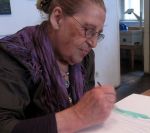Ceija Stojka
As a child she survived 3 NS-concentration camps. Through her books and pictures she contributed there was a way to make the fate of the Roma at that time publicy.
Ceija Stojka was born as the 5th of 6 children in a travelling Lovara family (horse dealer). They emigrated at the 2nd Half oft he 19th century from Hungary and Slovakia to present-day Austria. C.St. decsribed her mother as a strong, cheerful and traditional.conscious woman, who, although she was illiterate, she could eradiate security and safety because of her vision and intelligence.
Their father´s most fomative influence was the children`s development. Therefore it was important,since he could read and write, which was not common for the Roma at that time. Wherever they were he sent his children to school because in the interwar period the authorities were lenient when it came to the fulfillment of compulsory education for so called „gipsies“ Even in the traditional Roma communities the education enjoyed a low esteem.
Since 1939 it was forbidden to all Romas to change the place of residence. So the family decided to move permanently to Vienna. At first they lived in a modest wooden house, but the repressions of the Nazi-regime were getting worse. The father was murdered in the concentration camp in Dachau. The rest of the family was deported to the concentration camp Ausschwitz-Birkenau, where the youngest brother was infected during a medical experiment with typhoid fever and died. 1944 she, her mother and sister were sent to Ravensbrück and there C.St. had to work in the sewing room. Shortly before the end of the war they were transferred to Bergen Belsen. After the liberation the familiy lived on what the mother received von acquaintances who had remained in Vienna. C.S. said in an interview, if you had been in a concentration camp you can handle live in freedom also.
As a 13 year old girl she attended school once more by her own accord. The family was able to make plans for the future again. The still used to rove around, but instead of horse-cars now they used cars to visit the different market places.
Between 1949 and 1955 C.St. she gave birth to 3 children. The horse trade could not longer be continued and they acquired a license as a market driver in order to sell carpets.
The reason why Ceija had begun to write she described once:
„I wanted to talk to someone. But there was no one who would have listened to me and paper is patient“. „It was pretty hard for me to write, half an hour I`ve written, then I had to continue cooking“. Her brother Karl often said to her to throw away the doodle, instead she keept it. 1988 she published her book „We lived in hidding“ and in the German-speaking area it was sensational and found enough attention. First time a Roma woman turned against this life in the hidden, against subjugation and silence. Not one day passed, that she would not sit down to paint and write. She needed this occupation for herself, because if she had written about something, it meant that she had solved it for her.
In addition to the literature and art the third occupation was music. The traditional Lovaras´ music already influenced her childhood, so that she now made these tradtional songs public, together with her brother and nephew.
She received several awards (eg.Bruno Kreisky-Prize, associate Professor) Traveling to Japan, Germany, Czech Republic and other countries enriched her life.
Since the early 90ies Ceija Stojka. worked usually in Vienna in hundreds of workshops as contemporary witness with school classes and students.(in corporation with Verein Exil)
Author and translation: Charlotte Rastl
Sources:
http://wikipedia.org/w/index.php?oldid=116335072
http://romani.uni-graz/rombase
Stojka, Ceija, Berger, Karin: Wir leben im Verborgenen, Picus Vlg.1988/2013
Stojka, Ceija: Ausschwitz ist mein Mantel, Vlg.Edition Exil, 2009
Photocredits: Ceija Stoika, author unknown, Source: private property „Verein Exil“, Vienna, with friendly permission of Mrs. Stippinger.




